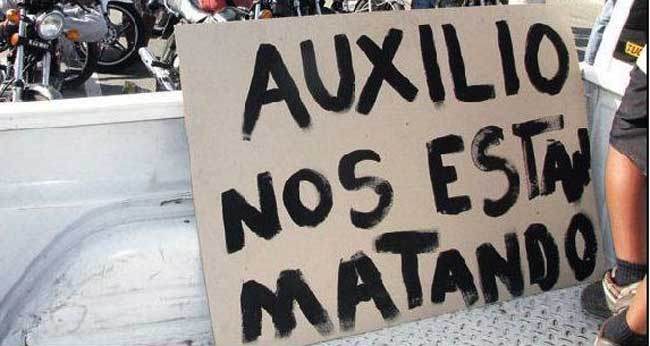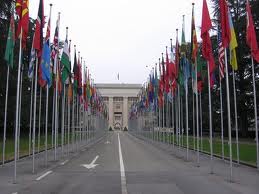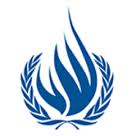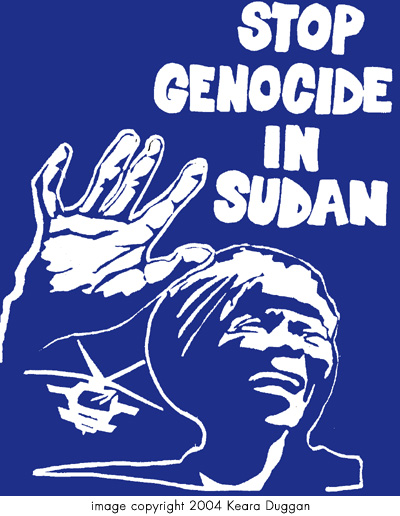WITHOUT HUMAN RIGHTS WE LIVE
Por Alexander Gamero
 Julián1 lost an eye, due to a corneal ulcer that was diagnosed 2 months late, medical negligence, and a public health system in collapse. Hilda, as a consequence of her extreme poverty and her troubled relationships with drunks, had to become a prostitute in order to make a living; and when that stopped working, she has even thought of setting her house on fire, with her daughters and herself inside. Palmira was consistently beaten up by her mother when she was a child, and when she became a mother herself she almost lost one of her daughters, due to the virtually non-existent basic public health services in her town. Miguel´s children have not managed to get into public universities because his father has signed a petition for a referendum to shorten the President’s time in office. Julián is from the center of the country, Hilda is from Guarenas – close to Caracas -, Palmira is from Guachara in the State of Apure, and Miguel is from the south of Anzoategui. What do they have in common, you ask? The four of them live in a country where Human Rights (HR) are violated on a daily basis; and they also live in a country which was just elected a member of the Human Rights Council of the United Nations (UN), a body supposed to promote the protection of the HR around the globe.
Julián1 lost an eye, due to a corneal ulcer that was diagnosed 2 months late, medical negligence, and a public health system in collapse. Hilda, as a consequence of her extreme poverty and her troubled relationships with drunks, had to become a prostitute in order to make a living; and when that stopped working, she has even thought of setting her house on fire, with her daughters and herself inside. Palmira was consistently beaten up by her mother when she was a child, and when she became a mother herself she almost lost one of her daughters, due to the virtually non-existent basic public health services in her town. Miguel´s children have not managed to get into public universities because his father has signed a petition for a referendum to shorten the President’s time in office. Julián is from the center of the country, Hilda is from Guarenas – close to Caracas -, Palmira is from Guachara in the State of Apure, and Miguel is from the south of Anzoategui. What do they have in common, you ask? The four of them live in a country where Human Rights (HR) are violated on a daily basis; and they also live in a country which was just elected a member of the Human Rights Council of the United Nations (UN), a body supposed to promote the protection of the HR around the globe.
How is this possible? A country where people doesn´t have access to high quality public health and education gets elected to be part of this Council?
We probably need to answer another question first.
What is the Human Rights Council of the UN?
According to its web2, it’s “an inter-governmental body within the United Nations system responsible for strengthening the promotion and protection of human rights around the globe and for addressing situations of human rights violations and make recommendations on them.” It meets in the city of Geneva, in Switzerland.
 The mechanisms and procedures it uses to achieve such an ambitious objective are basically 3: the Universal Periodic Review3, a mechanism intending to analyze the situation of the HR in the 192 Member States of the UN; the Advisory Committee4, a think-tank; and a Complaint Procedure5, allowing individuals and Non Governmental Organizations (NGO) to file for “major” violations of HR.
The mechanisms and procedures it uses to achieve such an ambitious objective are basically 3: the Universal Periodic Review3, a mechanism intending to analyze the situation of the HR in the 192 Member States of the UN; the Advisory Committee4, a think-tank; and a Complaint Procedure5, allowing individuals and Non Governmental Organizations (NGO) to file for “major” violations of HR.
The HR Council was founded in 2006 to replace the much discredited Human Rights Commission. Even though its objectives were laudable, was used mostly to attack Israel (over a third of the country-specific resolutions concerned Israel6). On the other hand, it ignored repeated violations of the HR done by some of its members: Russia, China, Sudan, the United States of America, Cuba, among others. Sudan’s particular case was highly controversial, because back then there was an active civil war – currently under a temporary peace treaty – around the Darfur region, being the government in one of the belligerent sides and being accused of attempting an “ethnic cleansing”. The conflict, also known as Darfur’s Genocide, was triggered by the alleged discrimination by the government of the non-Arab Muslims. The mortality figures vary; the British Parliament7 estimated the number of dead on 300,000, due to starvation and diseases produced by the displacement, on top of the direct deaths due to the armed conflict. United Nations estimate the number of displaced people on almost 3 million. During this period, the Sudanese government was a member of the Human Rights Commission…
But apparently the dismissal of the Commission and the creation of the Council were not enough, since this new body has sanctioned mostly Israel, ignoring for example the growing restriction to freedom of speech in Venezuela8. UN’s Secretary General Ban Ki-moon said, in an official statement9:
“The Secretary-General is disappointed at the (Human Rights) Council’s decision to single out only one specific regional item (Israel), given the range and scope of allegations of human rights violations throughout the world.”
We can see then that the efforts to promote HR, inside the UN itself, have been seriously flawed. Only a few are accused, and the allegations to allies are ignored.
Venezuela and Human Rights
 Given the recent events, it’s advisable to review a few articles of The Universal Declaration of Human Rights10 and make some comments on the Venezuelan case.
Given the recent events, it’s advisable to review a few articles of The Universal Declaration of Human Rights10 and make some comments on the Venezuelan case.
Article 1: “All human beings are born free and equal in dignity and rights. They are endowed with reason and conscience and should act towards one another in a spirit of brotherhood.” And a fragment of Article 2: “Everyone is entitled to all the rights and freedoms set forth in this Declaration, without distinction of any kind, such as race, color, sex, language, religion, political or other opinion…” Do all Venezuelans have the same rights with this government? Does someone who signed to ask for a plebiscite to retire the President from power have the same rights as someone who belongs to the ruling party (PSUV)? Miguel’s testimony, for example, whose children were excluded from the public universities because he himself is a detractor of the President, seems to indicate the opposite.
Article 3: “Everyone has the right to life, liberty and security of person.” The Venezuelan government does not guarantee minimal personal security conditions. Unofficial figures11 from the NGO Observatorio Venezolano de Violencia place the number of murders on 2011 over 19 thousand, which means 53 deaths per day, and over 2 per hour. Our relative murder rate is 4 times that of Mexico, where the conflict with drug dealing cartels has war-like characteristics. The government itself recognized its incompetence in this area, on the 2011 Universal Periodic Review12: “Fully guaranteeing the right to life, and specifically the right to public security, continues to be a challenge, but work is continuing to design and implement public policies that tackle the problem from an essentially scientific perspective.” The scientific perspective has produced over a dozen of national security plans, including the recent Presidential Commission on Weapons. Nevertheless, the crime rates in the country have consistently increased, year on year off.
Article 5: “No one shall be subjected to torture or to cruel, inhuman or degrading treatment or punishment.” The recent TV reportages on the living conditions inside Venezuelan prisons come to mind. In The Economist’s words14 “Far from being secure places of rehabilitation, too many of the region’s jails are violent incubators of crime” “(…) at least 26 prisoners died in a battle between gangs inside Yare jail in Venezuela… A similar number died in a riot at El Rodeo, another Venezuelan prison, last year, which saw gang bosses hold out against thousands of national-guard troops for almost a month.”
A risible Human Rights Council
A complete analysis of the HR situation in Venezuela is beyond the scope of this article. It is, however, clear that the government has not managed to guarantee the most basic human rights, starting by the right to life, even though it has repeatedly tried. Therefore, how can a representative of President Chavez’s government sit in this Council?
 Given the inclusion of governments with dubious legitimacy of origin, such as Sudan or Cuba, and others who flagrantly and evidently violate HR such as Russia or China, we cannot but conclude that, disregarding its quest for valid and desirable objectives, the Human Rights Council of the United Nations is risible. A body that does not equally evaluate all of UN’s Member States. One more instrument in the anti-Semitic quest of half of the world. An instance where despotic governments go to defend themselves, and not to change their actions regarding HR.
Given the inclusion of governments with dubious legitimacy of origin, such as Sudan or Cuba, and others who flagrantly and evidently violate HR such as Russia or China, we cannot but conclude that, disregarding its quest for valid and desirable objectives, the Human Rights Council of the United Nations is risible. A body that does not equally evaluate all of UN’s Member States. One more instrument in the anti-Semitic quest of half of the world. An instance where despotic governments go to defend themselves, and not to change their actions regarding HR.
Then, it is valid to ask ourselves: Is it really relevant that our high school and college students participate in a “Human Rights Council”, within the frame of a Model of United Nations? Should we encourage respect for an inter-governmental body that has so many flaws and contradictions? Where are the Human Rights in the world going, if the organism responsible for promoting them skips a sanction – or even a serious discussion – to governments reaching the border of genocide?
Twitter: @AlexGameroG
References:
- 1. These stories come from “Así nos tocó vivir: historias que están detrás de la pobreza”, edited by Prof. Luis Pedro España. Universidad Católica Andrés Bello, Asociación Civil para la Promoción de Estudios Sociales. Caracas, 2005.
- 2. United Nations, Human Rights Council. http://www.ohchr.org/EN/AboutUs/Pages/WhoWeAre.aspx
- 3. Transparency International. Spanish website http://www.amnesty.org/es/united-nations/universal-periodic-review/background
- 4. United Nations, Advisory Committee to the Human Rights Council. http://www.ohchr.org/EN/HRBodies/HRC/AdvisoryCommittee/Pages/HRCACIndex.aspx
- 5. United Nations, Human Rights Council’s Complaint Procedure. http://www.ohchr.org/EN/HRBodies/HRC/Pages/Complaint.aspx
- 6. Ending Bias in the Human Rights System, the New York Times. Published on May 22nd, 2002. http://www.nytimes.com/2002/05/22/opinion/ending-bias-in-the-human-rights-system.html?scp=1&sq=%22Anne+Bayefsky%22&st=nyt
- 7. Darfur death toll may be 300,000, say UK lawmakers (Reuters), March 30th, 2005.
- 8. A Shadow on the Human Rights Movement, by Jackson Diehl, June 25th, 2007; Page A19, The Washington Post and Compilation of UNCHR resolution, 2006–2007Eye on the UN.
- 9. United Nation’s Secretary General, Ban Ki-moon. Official Statement. http://www.un.org/News/Press/docs/2007/sgsm11053.doc.htm
- 10. Universal Declaration of Human Rights, approved in December 10th 1948 UN’s General Assembly in Paris. http://www.un.org/es/documents/udhr/index_print.shtml
- 11. Vénézuela: record de criminalité en 2011. L’Express, December 29th 2011. http://www.lexpress.fr/actualite/monde/amerique/venezuela-record-de-criminalite-en-2011_1066364.html
- 12. Universal Periodic Review. Geneva, October 3rd to 14th, 2011. http://daccess-dds-ny.un.org/doc/UNDOC/GEN/G11/150/04/PDF/G1115004.pdf?OpenElement
- 13. “Presidential Commission on Weapons” refers to the Comisión Presidencial para el Control de Armas, Municiones y el Desarme; created in May 2011. http://comisionpresidencialdesarme.gob.ve/
- 14. The Economist, print edition. September 22nd to 28th, 2012. Volume 404, Number 8803. Pp. 44-46.
- Mi «guayoyo» desparramado por el diccionario - 18 mayo, 2025
- Lo que hay que saber sobre la declaración de ley marcial en Corea del Sur - 4 diciembre, 2024
- Bitcoin, imparable: a cuánto puede llegar su precio en medio del “efecto Trump” - 24 noviembre, 2024
